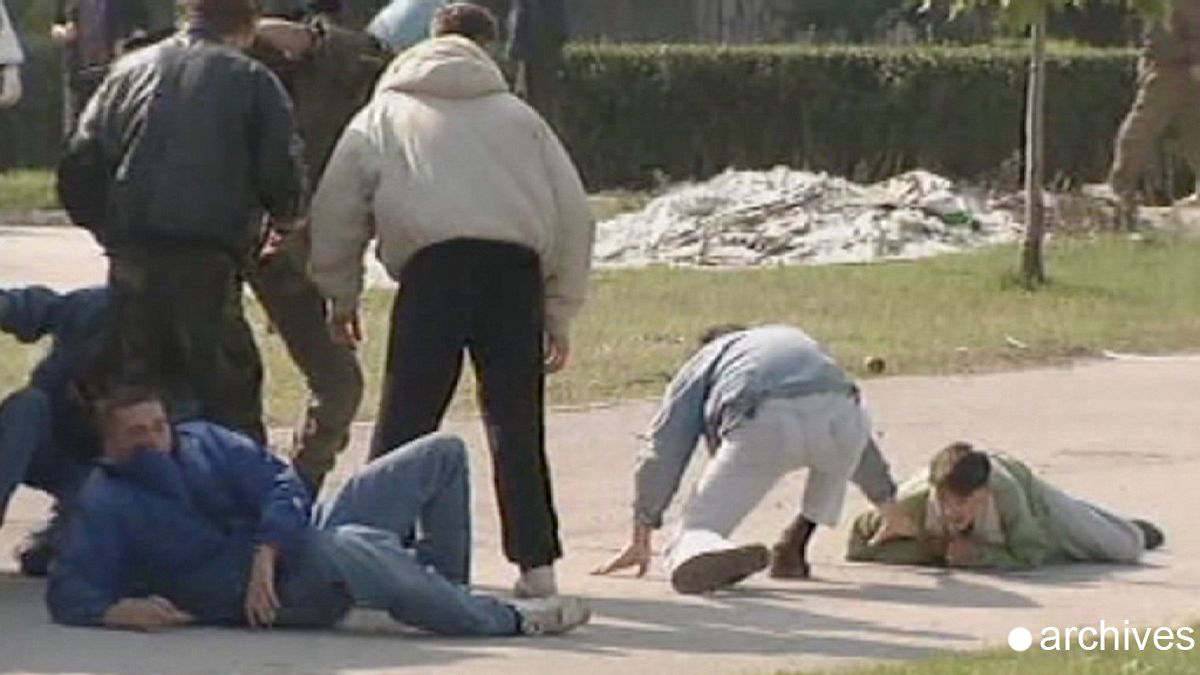In the capital of Bosnia and Herzegovina, April 6 marks 20 years since the beginning of the siege of Sarajevo in 1992. It was the longest siege in the history of modern warfare. It became one of the tragedies of the break-up of Yugoslavia.
A plaque on a bridge commemorates the first victim killed by a sniper on the day the siege began.
For the next three and a half years, Bosnian Serb forces, with artillery from the army of the ex-Yugoslavia, fired on the city with impunity. Civilians were the snipers’ easy prey. For a long time, the world’s powerful countries did not intervene. This controversial subject still provokes strong emotions.
The Bosnian war ended with the Dayton peace accords at the close of 1995. UN data citing the ICRC speak of a death toll in the hundreds of thousands. More than 11,000 were killed in the capital.
Ethnic and nationalist divisions fester, Bosnia and Herzegovina today divided into two separate entities: the Bosnian Muslim Croat Federation and the Serb Republic of Sprska.
Its president, Milorad Dodik, used to be considered a moderate. And then he refused to acknowledge the genocide of Srebrenica, in which some 8,000 Muslims were killed in the summer of 1995.
But Bosnian Muslim leaders have also been criticised. The top religious figure in now 80 percent Muslim Sarajevo, has to answer charges that he has not done enough to encourage reconciliation, which he denies.
Mustafa Ceric, Grand Mufti of Bosnia and Herzegovina said: “We made progress after the Dayton Agreement in recovery more than any other region in the world. But you know, when we make one step forward, there are forces who come and get us all backwards. And then we have to explain all the questions that we were explaining prior to the genocide in 1992 and ’93. How can you forgive somebody if he doesn’t ask forgiveness for his atrocities?”
Sarajevo researchers said around two thirds of those killed in the war were Bosniak, a quarter Serb and ten percent Croat. Tens of thousands of women and girls were systematically raped.
Euronews spoke with Refik Hodzic, a Bosnian who now lives in New York City, about obstacles in the way of reconciliation in Bosnia and Herzegovina today.
Hodzic is a filmmaker, journalist and communications director for the International Centre for Transitional Justice. He has worked for years to help both international and national courts seek justice for war crimes.
Valerie Zabriskie, euronews: Mister Hodzic, you have been critical of the grand mufti of Bosnia and Herzegovina. Why?
Refik Hodzic: In today’s Bosnia there is a great need for a thorough and honest reckoning with the past and healing of all communities in regard to the great suffering that we have experienced twenty years ago. Mustafa Ceric and Milorad Dodik are two of the leading opinion makers in Bosnia and Herzegovina today, and the two of them – as the most influential personas in the country – have a responsibility to work and achieve this reckoning in the communities in Bosnia. But on the contrary, their agendas are more directed towards division, towards the incitement of fear and hatred towards others.
euronews: But who can put pressure on them? Should it be the international community or you the people of Bosnia themselves. Why is it continuing like this?
Hodzic: The international community, unfortunately, has employed double standards and has allowed people like Milorad Dodik or Mustafa Ceric to get away with the rhetoric of division, rhetoric of hatred when at the same time it is purporting, to support Bosnia on its path to the European Union. So there I think lies the responsibility of the international community to enforce standards that are natural in the European Union. For instance, Angela Merkel from Germany would never get away with denying the Holocaust in the way that Milorad Dodik denied this genocide in Srebrenica with tacit ignorance of the international communities.
euronews: You are critical of political and religious leaders and also the international community, but what about the Bosnians themselves? Do they have a share of the blame in the lack of reconciliation?
Hodzic: I have to say that the people themselves in Bosnia, we are not evil people. We are not people who cannot forgive, who cannot feel compassion for others. In the city, Prijedor, where I come from, it has seen some of the worse violence, concentration camps, killings and murders of more than 3,000 people… today, you have again mixed marriages, again people being friends regardless of their ethnicity but that is despite the atmosphere imposed by the leaders like Milorad Dodik and Mustafa Ceric.
euronews: It’s only been twenty years since the war broke out in Sarajevo and Bosnia. Some will say the wounds are still too raw for reconciliation.
Hodzic: I have to say the time is now. The time was yesterday for the process of reckoning with what happened. We need an honest, open, compassionate debate about what happened to us because otherwise the new generation will be a generation which will grow up on the narratives of division, narratives of hatred, separate histories on what happened. And we will not have much to hope for from the new generation.


